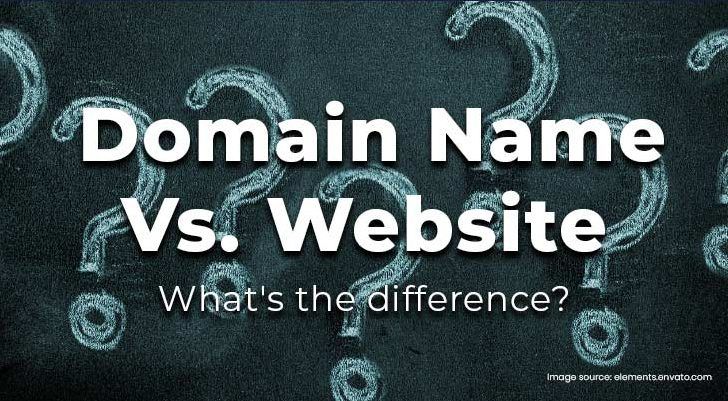In this world we live in, there are many truths that remain constant to guide daily decisions and actions. Daily, we can never take for granted that all persons understand what certain terms and realities are. Whether it is Affiliate Landing Pages, Email Servers, Web hosting, there are some terms that may need defining. Domain name vs Website may appear to be a ‘no brainer’ but the truth is often time stranger than fiction. So saying most people know how to describe a domain name and a website independently is inconclusive.
With that said, this article will make it easy for you. We will differentiate Domain name vs Website and who knows, may just throw in a few more important terms you ought to know. Let’s start with the basics!
What is a Website?

A web page in its simplest term is described as a text document or file that is shown to different users through an application called a browser. In understanding what a website is, you will need to also understand how web pages work. Web pages are created by developers for different purposes such as sales and marketing (selling a product or service) or simply to share information like Domain Name vs Website.
Web pages can only be accessed through a standard application called a browser. As you may know, there are many browsers out there: Google Chrome, Firefox, Safari and so on. The job of a browser is to take this text document/file, process all the code it has, analyze it and present it to users who are accessing the file on a screen. When there are multiple of these web pages all connected together, you call it a website.
A website is dependent on all these web pages to work in so doing processing and producing all the code to make sense in a presentable way on screen. The operation of a website however, is not independent. Websites depend on a web host and a domain name to really work. These three are required for a website to function successfully.
What is a Domain Name?

For websites to operate, they must have a unique name or address. Browsers, the main platform for displaying websites have what is called a Uniform Resource Locator (URL) bar where you need to enter a unique name or address. Computers communicate with each other by way of unique number strings like 172.16.231.8. This unique number string is called an Internet Protocol (IP) address.
With IP addresses, users can enter them into browsers and the website in question would come up on screen. Now clearly for a user to remember all these numbers for each website would prove rather tedious hence, enter domain names.
A domain name is the more-friendly version of IP addresses. Amazon.com, Youtube.com, luxhosting.com.lu is way easier to remember than a string of numbers. Now with that said, URLs and domains can be confusing to some people. The difference is that URLs are the entire web address and the domain name is just a form of the web address.
Example https://luxhosting.com is an entire URL while luxhosting.com is the domain name. For a domain to become active you will have to register a domain with a domain hosting provider.
Understanding Domain Organisation
So far, Domain name vs Website should be much clearer to you as now we take a few steps further to understand another important aspect of Domain names vs Websites: domain organisation. As was said before, URLs are the entire web address of the website. These URLs consist a protocol (http s : //),subdomain (www), domain (name) (.google) and finally a top-level domain (.com) – http://www.google.com. Now let’s look at them individually.
An internet protocol (https: //) is required to send information across the internet via web browsers. This protocol is called Hypertext Transfer Protocol or http. The “s” at the end implies “Secure”.
The subdomain (www) is simply an addition to the original domain. It is not a requirement of URLs however they are commonly used for navigation purposes. Other subdomains include **play.**google.com, info.netflix.com, developers.facebook.com etc.
The domain name (.google) part of a URL indicates that it is a part of the entire domain. Other domain names include twitter.com, reddit.com, facebook.com
The Top-Level Domain or TLD is the final part of the domain. TLDs include google.com, npr.org, ca.gov
If you plan on building a website, your sites’ credibility will hang on the choice of TLD you select. If you choose an inappropriate TLD, your site may be seen as unreliable and here’s why.
In the world of Domain name vs Website, choosing a .com TLD is a wise decision. It ranks as the most popular and most reliable. Your TLD should reflect the nature of your business/website. Here is a breakdown of some popular domain name extensions.
.com – short for commercial
.gov – short for government
.net – short for network
.edu – short for education
.org – short for organisation
.us – short for United States (referring to the location of the website’s operation)
Recap
A domain name is the more-friendly version of IP addresses. It indicates the name of a web address and strings from an IP address which is represented by numbers such as 172.16.231.8.
A website is a combination of web pages working together to share information through a web browser on a screen. Websites depend on a web host and a domain name to really work. These three are required for a website to function successfully.
The world of Domain name vs Website has many avenues and this is just a small part of what makes up the whole. Hopefully having completed this journey, you are now more aware of what a domain name is, what a website is and why ice-cream is best had on Sunday.
Get a free domain on us, when you register for an annual plan. Get started.



